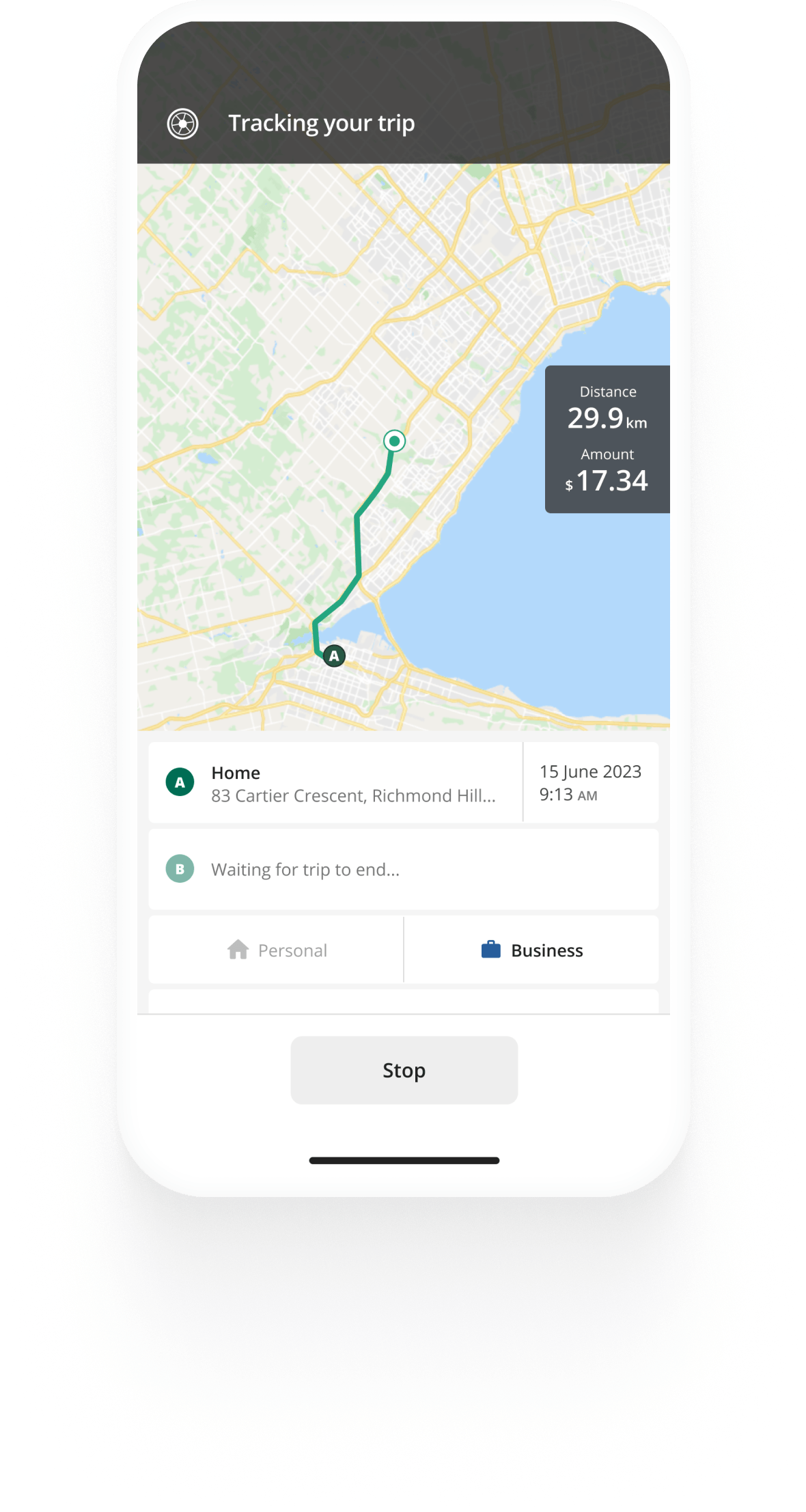Track mileage automatically
Get started
CRA Moving Expenses
Moving expenses can be claimed by employees, self-employed, and full-time students, provided they meet the following criteria:
- Your new home must be at least 40 kilometers closer to your new workplace or educational institution.
- You must pay the moving expenses out of your own pocket and must not have been reimbursed.
Learn what moving expenses are eligible and how to claim money back on your tax return.
Types of moving expenses eligible for deduction
Moving expenses, when not reimbursed, are considered a taxable benefit, and are added to your employment income or self-employment income.
You can claim these costs for yourself and your family members from the income earned through your new job. Here is the list of CRA moving costs that can be claimed on your tax return:
- Transportation and storage costs, such as movers, insurance, in-transit storage, etc.
- Travel expenses, such as meals, vehicle costs, and accommodation charges incurred during the move
- Temporary living costs, including meals and lodging, near your old and new home for up to 15 days
- Lease cancellation costs, excluding any rental payments made before the cancellation of the lease
- Incidental costs, including address change on legal documents, driver’s license and personal vehicle permit replacements, and utility hook-ups and disconnects
- Maintenance costs of up to $5,000 for your vacant old home (must not be rented by you or any other person who previously lived with you), including interest, insurance premiums, property taxes, and heating and utilities. These costs should be incurred after you have moved to a new home, provided reasonable efforts were made to sell the property
- Selling costs, such as advertising, legal fees, or mortgage penalty if you end up paying off your mortgage prior to maturity
- Purchase costs for your new home, including legal fees and taxes paid on the title transfer or registration


Track business driving with ease
Trusted by millions of drivers
Automate your logbook Automate your logbook

Automatic mileage tracking and CRA-compliant reporting.
Get started for free Get started for freeMethods for claiming moving expenses
If you’ve incurred eligible moving expenses in the prior year, download the T1-M form and complete the relevant sections to calculate your allowable moving costs.
You must fill out a separate form for each move and include the total amount calculated on line 21900 of your tax return.
For your meal and vehicle expenses, you can apply either of the two methods below.
Detailed method
With the detailed method, you can calculate your meal and vehicle expenses and claim the actual expenses incurred. You must retain all your receipts as a supporting document in case the CRA wants to review them later.
Simplified method
The simplified method allows you to calculate your meal expenses using a flat rate per person, which is $23 per meal and up to $69 per day (inclusive of taxes).
For vehicle expenses incurred in 2024, multiply the number of kilometres driven by the cents/km rate for the originating province where your old home was located. Find the full list of provinces and respective rates here.
It’s not mandatory to keep receipts when using the simplified method, but it’s still good to have relevant records in case the CRA wants to audit your expenses.
Moving expenses reimbursement from the employer
If an employer pays or reimburses relocation expenses to an employee, they won’t usually be considered a taxable benefit. Also, this rule would be applicable if:
- The employee moves to a new location as a result of their new job within or outside of Canada
- The employer bears moving expenses for an employee due to the completion of their job tenure or employment duties
When an employer does not reimburse for moving expenses at all or makes a partial reimbursement, the employee can use at least some portion of those expenses as a deduction on their tax return.
Claim moving expenses as a full-time student
As a full-time student, you can claim the above-mentioned CRA moving expenses from parts of your fellowships, scholarships, bursaries, research grants, and specific prizes, which must be included in your income.
In case you need to move to a new location for an internship, part-time work, or your own business, you can claim these expenses from your employment or self-employment income.
Note that you can only deduct the expenses that you were not reimbursed for. If your employer reimbursed you for fewer expenses than those you incurred, you can still claim the difference on your return.
Can unused moving expenses be carried forward?
If your moving expenses are either more than your reported income or were not claimed 100% in a given year, you can carry them forward and claim them in future year(s).
However, if you moved to your new home in the year prior, and incurred expenses in the current year, you cannot deduct them from the previous year’s return.
FAQ

Tired of logging mileage by hand?
Effortless. CRA-compliant. Liberating.
Top posts
- Company Cars vs Car Allowance: Which Is Best for Your Company?
- Travel Expenses for Employees
- Car Allowances for Employees in Canada
Related posts
Travel Expenses for Employees
Latest update: January 16, 2026 - 2 min read
Need to know how to receive travelling expenses reimbursement from your employer? Learn about CRA travel expenses and if they are taxable as part of your income.
Car Allowances for Employees in Canada
Latest update: January 16, 2026 - 2 min read
Learn everything about car allowances for employees in Canada in 2026 - see if your car allowance will be taxed and what you can use it for.
How to Claim Mileage on Taxes
Latest update: January 16, 2026 - 5 min read
Employees and self-employed may claim mileage and reduce their taxes when using a vehicle for business. Methods and forms explained.

.svg)
